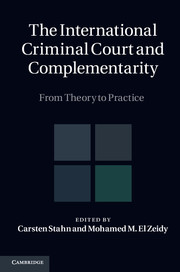Book contents
- Frontmatter
- Contents
- Acknowledgments
- Foreword by HE Judge Sang-Hyun Song
- Foreword by Patricia O’Brien
- Foreword by Silvia A. Fernandez de Gurmendi
- List of abbreviations
- Introduction: bridge over troubled waters?
- PART I General reflections
- PART II Origin and genesis of complementarity
- PART III Analytical dimensions of complementarity
- PART IV Interpretation and application
- 14 The application of the principle of complementarity to the decision of where to open an investigation
- 15 Situation and case: defining the parameters
- 16 The inaction controversy
- 17 The admissibility procedures
- 18 The evolution of the ICC jurisprudence on admissibility
- 19 Interpretative gravity under the Rome Statute
- 20 Complementarity and burden allocation
- PART IV (Continued) Interpretation and application
- PART V Complementarity in perspective
- PART VI Complementarity in practice
- Index
- References
18 - The evolution of the ICC jurisprudence on admissibility
from PART IV - Interpretation and application
Published online by Cambridge University Press: 05 November 2014
- Frontmatter
- Contents
- Acknowledgments
- Foreword by HE Judge Sang-Hyun Song
- Foreword by Patricia O’Brien
- Foreword by Silvia A. Fernandez de Gurmendi
- List of abbreviations
- Introduction: bridge over troubled waters?
- PART I General reflections
- PART II Origin and genesis of complementarity
- PART III Analytical dimensions of complementarity
- PART IV Interpretation and application
- 14 The application of the principle of complementarity to the decision of where to open an investigation
- 15 Situation and case: defining the parameters
- 16 The inaction controversy
- 17 The admissibility procedures
- 18 The evolution of the ICC jurisprudence on admissibility
- 19 Interpretative gravity under the Rome Statute
- 20 Complementarity and burden allocation
- PART IV (Continued) Interpretation and application
- PART V Complementarity in perspective
- PART VI Complementarity in practice
- Index
- References
Summary
The principle of complementarity, and the admissibility provisions which implement it, were the subject of little examination in the first years of the International Criminal Court's (ICC) operation. However, between September 2008 and September 2009, three appeal judgments on admissibility were delivered or unsealed. This chapter examines these judgments, and related proceedings, providing a structured analysis of the state of the ICC's jurisprudence on admissibility. It examines both substantive and procedural aspects of admissibility, identifying the elements which have now been settled by the Appeals Chamber, and considers what this emerging jurisprudence tells us about the purpose and focus of the different limbs of Article 17.
Introduction
The principle of complementarity is, without doubt, one of the defining features of the Rome Statute. Nevertheless, despite being described as the cornerstone of the Statute, the admissibility provisions were the subject of relatively little judicial examination during the early years of the Court's operations. Recently, this has changed. A suite of three appeal judgments which were delivered or unsealed between September 2008 and September 2009, and the proceedings which led to these judgments, have now laid a solid foundation for our understanding of the principle of complementarity and the interpretation of the admissibility provisions of the Statute.
- Type
- Chapter
- Information
- The International Criminal Court and ComplementarityFrom Theory to Practice, pp. 558 - 602Publisher: Cambridge University PressPrint publication year: 2011
References
- 3
- Cited by



